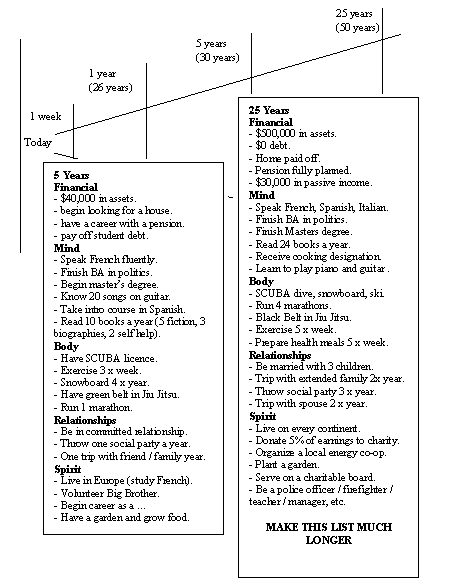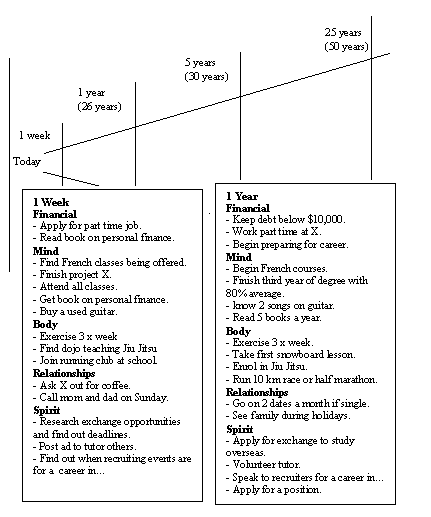Goal Planning
We offer a great deal of information and practice material to help prepare people for the application and testing process. The information in this section will apply a little more broadly in life, but if used properly can greatly enhance your chance of one day being hired and even more importantly help you plan a very successful life.
The first thing that you need to know is the difference between a “Goal” and a “Dream”. The key difference between these two words is that a “Goal” includes a plan on how to achieve it, while a “Dream” does not. Many people have “Dreams”, but very few will ever achieve them because they have not set out a defined plan on how to make them come true.
There was a study done a number of years ago looking at the success rates of a graduating class of students at a prestigious US college. Many of the graduates had went on to lead great lives, but there were a number of students who achieved extraordinary success. When the researchers investigated, they could not see any correlation among these “extraordinary achievers” and the marks they received in school. Many of these achievers were average or below average students. The one correlation they did discover, was that without fail, all of the “extraordinary achievers” from the study had a habit of writing down the goals they were trying to achieve in life. By actively planning they were able to achieve tremendous financial and personal success in life.
About Goals
There are a couple of key dynamics that all goals should have, which are easily remembered using the “SMART” acronym.
Whenever you are creating a goal or making a plan, make sure it is specific. If it is vague, or unclear, it is unlikely that you will achieve it and it will be difficult to measure how effective your efforts were when you are reviewing your results.
Bad Examples:
“I plan to be rich one day.”
“I plan to strengthen my mind.”
“I plan to get in better physical shape.”
“I plan have a stronger relationship with my husband / wife / children.”
“I plan on doing volunteer work”
Good Examples:
“I plan on having a strong asset base and no liabilities / debts.”
“I plan to study at University or College.”
“I plan to go to the gym and play a specific sport (hockey, yoga, Frisbee, etc).”
“I plan on spending quality time with my wife / husband / children.”
“I plan on volunteering with Big Brothers and becoming a mentor.”
In each of the “Bad Examples” above, the goals are vague or ambiguous. How would you really know if you achieved any of them in any meaningful way? What does it mean to be rich? Having nice cars and a big house? What about strengthening a mind? Does this mean watching more or less television? How do you know if you are in better shape? How would you have a stronger relationship with your family? What do you mean by volunteer work? With the good examples, you have a clear target to work toward. There is no confusion about what you are trying to achieve. If you have a Specific Goal set out, you are more likely to achieve or even surpass it.
If you can’t measure your efforts, it is impossible to gauge your success or failure. It is similar to a report in school, or points in a game. You will feel very good about yourself as you begin accomplishing your goals. Even if you don’t succeed with some of them, you will feel proud about how much you did accomplish. For instance, if your goal was to read 24 books a year, you would still feel great about yourself if you achieved only 18 books. To make the “Good Examples” above, better, consider the following:
Better Examples:
“I plan on having $100,000 in assets without any liabilities or debts.”
“I plan to finish my diploma / degree in a specific field taking specific courses.”
“I plan to go to the gym three times a week for at least 30 minutes and play hockey once a week.”
“I plan on spending two hours quality time with my wife / husband / children each day and one entire day on a weekend.”
“I plan on volunteering with Big Brothers and becoming a mentor, giving two hours of my time each week.”
It is much easier to work toward goals if you have key success stages in mind. It’s similar to athletes having a finish line they are working toward, or a pilot with a destination in mind to guide their actions. As mentioned above, don’t get discouraged if you don’t achieve 100% of your goals. If you do, you may have set them a bit low. If you achieve them too easily, make them larger or more challenging.
It is important to be able to break your goals down into actionable steps. Some of the above goals may seem overwhelming or impossible to achieve, but you can begin breaking each of the goals down into smaller actionable steps, which once achieved, will push you closer to accomplishing what you set out to do. Actionable steps for each of the above goals could be:
Actionable Steps:
“I plan on reading two books on financial planning and setting up a meeting with a financial advisor by the end of the month.”
“I plan on getting course information and registering at a school within three weeks.”
“I plan on registering for a gym in the neighbourhood this week and finding out a hockey program to attend this winter.”
“I plan on organizing the first family outing for this Sunday.”
“I plan on setting up an appointment to speak to a volunteer coordinator by the end of the month.”
You will become very discouraged and give up, if you set completely unrealistic goals. It is a good idea to push yourself and set some goals that may be difficult to achieve, but if you are completely unrealistic with what you are working for, you will not accomplish it, potentially waste a great deal of time and miss out on some other exciting opportunities in life. It doesn’t make sense to set a goal to become an Olympic Gymnast if you are 45 years old. It is highly unlikely that you will become a millionaire in 30 days if you are starting from zero. Make your goals challenging, but be realistic. If you are successful, keep pushing yourself by making more challenging goals and you will surpass your expectations.
One final aspect of goals is to set target dates. Setting challenging goals are important, but you have to hold yourself accountable to achieving them. Without setting due dates, people often procrastinate, or push their goals into the unknown future. Due dates hold you accountable and force you to take action. There may obviously be some flexibility to these dates, and as mentioned above, you shouldn’t feel discouraged if you are accomplishing a great deal, but haven’t completed a goal. Reset the date to a realistic time and continue pursuing your goal if you still seek to accomplish it. To improve upon the “Better Examples”, consider the following:
Best Examples:
“I plan on having $100,000 in assets without any liabilities or debts within five years.”
“I plan to finish my diploma / degree in a specific field taking specific courses within 3 years.”
“I plan to go to the gym three times a week for at least 30 minutes starting this week and play hockey once a week beginning in November this year.”
“I plan on spending two hours quality time with my wife / husband / children each day starting immediately and one entire day on a weekend starting in two weeks when I finish an important work project.”
“I plan on volunteering with Big Brothers and becoming a mentor, giving two hours of my time each week starting this September.”
Each of the above goals has a very clear time frame for when action is require to have taken place. These are some of the key dynamics goals should have in order to lead to success. If you understand the importance of the above dynamics, you can begin planning your goals.
Step 1: Set Out Where You Want to Go in the Long Term
Many large corporations set goals that they would seek to achieve over the long term (25 years). It is important to know where you are going. Without setting these long term goals, you can work very had and achieve mediocre results, or unintended results that are of no use to you.
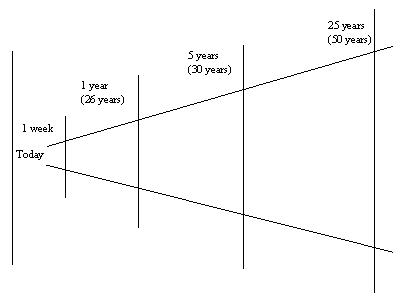
Start your planning with where you ultimately wish to end up. Make it a big list. 25 years is a long time and you will be surprised how much you will be able to accomplish. You will also be surprised at how fast it goes by. Make your 25 year goals “SMART” goals as outlined above. Keep a small journal so you can look at the goals regularly and make notes for Step 4. A pocket calendar or appointment book is a good idea or an electronic organizer.
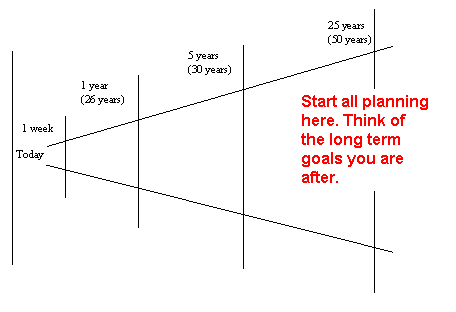
Step 2: Work Backwards
Once you have a list of everything you wish to accomplish in 25 years, work backwards and think what you would like to accomplish in five years, which will help you achieve your 25 year goal. For example, if you have a 25 year goal to have a successful career as a police officer with experience in tactical work, investigations the marine unit and a promotion to a higher rank, your five year goal might be to be hired as a serving member of a specific police service.
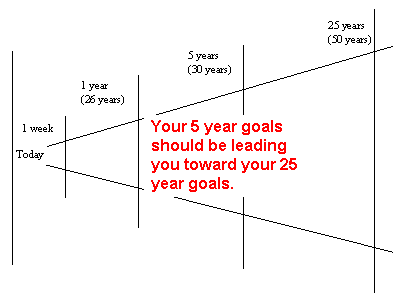
Step 3: The Year Ahead
After you have your list of five year goals, work backwards again. What do you need to accomplish this year which will lead to your five year goal and eventually to your 25 year goal. Following the same example, your one year goal may be complete the first year of a college or university program with an 80% average. You may also add other goals for the year, such as 40 hours of volunteer experience with an organization, and / or a successful part-time job in the service industry. Focus on steps and activities you will be able to accomplish this year.
Each year, take a hard look at your goals. Sometimes they will change. There is nothing wrong with this. Events happen in life that may make you change your mind. You mind begin studying a course and find it doesn’t interest you. That is fine, make a change. A life event might change your priorities. Again, there is nothing wrong with this, adapt. You may accomplish goals quicker than you realize was possible. Excellent, make new goals and plans. Just remember so long as you are still working towards goals, hold yourself accountable to the time line. At the end of year 1, review what are now your 24 year goals, followed by your four year goals and then make new goals for the upcoming year. Another idea, is to put the age you will be in 1 year, 5 years and 25 years in your goal planning.
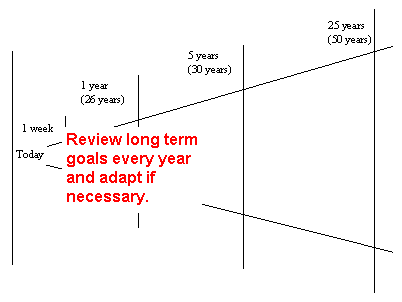
Step 4: Actionable Steps
Finally, each week, review what actionable steps you will perform this week to help you achieve your one year goals. Examples could be finishing a project that you are working on for school, attending a volunteer meeting, attending a recruitment event with a local police service, beginning a workout regime to get in shape, beginning a program to help you prepare for the testing, etc. All of your actions will be aligned to your 1 year, 5 year and 25 year goals. Find a quiet time once a week to review your goals and make a list of things to accomplish for the upcoming week aligned to your goals.
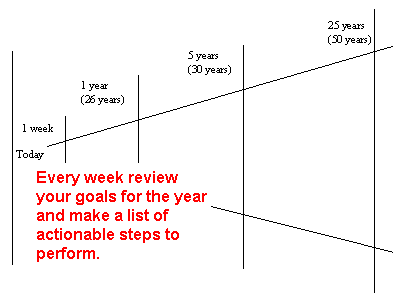
Organizing / Prioritizing Your Life
Personal LifeYou are ultimately responsible for how your life will unfold. It is important to plan on what you want to achieve, no matter what age you are. In order to help organize your goals so you have best / happiest life, I’d suggest you focus on the following areas:
Anyone who says money is unimportant to your happiness is a fool. Try to imagine how happy you would be if you couldn’t afford to feed your children. Money issues are the number one reason for fights in marriage, and a huge source of stress to individuals who do not manage their money properly. Everyone is going to have different monetary goals, but regardless of whether you plan on being rich, or comfortable, you should set out financial goals in life.
Friends and family are a huge source of support and happiness in life. You should set goals on what you wish to achieve with your friends and family, how often you wish to see them, what events you wish to do with them and continually work on strengthening bonds and developing new ones. It is difficult to find happiness if you are lonely or treat people poorly.
Learning is important in life. It doesn’t have to be formal education, but you should continually challenge yourself and grow. Read more books (fiction and non-fiction) in areas that interest you. Take courses at school or work, learn languages, take classes that interest you (photography, cooking, computers, dance, art, etc.). You will find great reward in continual learning and find opportunities present themselves as you keep adapting and growing.
You could have all the money in the world, great relationships, and strong learning, but if I told you, you had a week to live, it is hard to maintain your happiness. Eat properly, get adequate sleep and exercise as much as you can. Do things you enjoy. Go to the gym, go hiking, play sports, take yoga, go hiking, run marathons, go scuba diving, snowboarding, whatever, but respect your body and work at keeping it strong.
Make sure you feel you are contributing positively in some way to the world and feeling connected to it. You may find this through your work, your volunteer activities, your religious beliefs, and your behaviours. Act with integrity and be honest. Consistently work on improving yourself and the lives of others. Travel, explore, live an exciting life.
Many of the goals you will set in your personal life will overlap into your professional. For example some of your financial goals one week actionable items will include things to do at work. Some of the challenges you will seek developing your mind may be work related material or courses. Many of the important relationships in life will be business or work related. You may wish to add a sixth component for your life planning entitled career, but I have found that covering the above five areas (Financial, Relationships, Mind, Body and Spirit) includes your time at work adequately.
Example:
